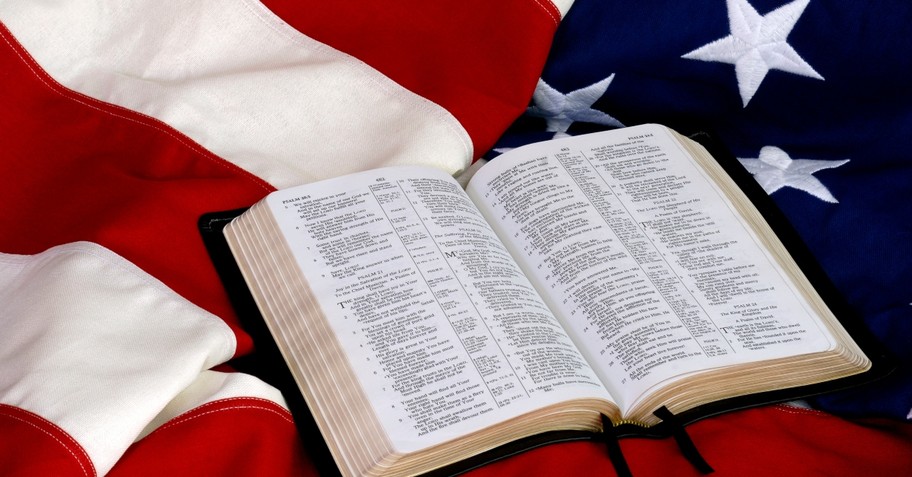What Does the Bible Have to Say about the Government?

With polarizing political views and seemingly endless bickering about what does and does not make “good government” or “godly leaders,” it’s sometimes difficult to wrap our minds around what God thinks about government. It can be even more difficult for us to understand how to behave or think as Christians.
But government is not a new system for organizing people, and God has a number of things throughout Scripture to say about this.
What does the Bible say about the government? For starters, God wants us to be obedient—to Him and to the authorities.
Photo credit: ©Getty Images/Muni Yogeshwaran

What Does the Bible Say about the Government?
It helps first to understand that God is the ultimate government. As creator of the universe, who made every person on earth and who has an ultimate plan, God reigns supreme. He makes the decisions and lays out our path. He gives us our laws and commands. Our job is simply to follow Him.
When humanity disobeyed God and was cast out of the Garden of Eden, a wall formed between us and God. As Adam and Eve first did, people chose to follow their own thinking. Many turned to wicked ways. By the time of Noah in Genesis 5, all on the earth were wicked, and God decided to send floodwaters, wipe out all life on the earth – with the exception of those on Noah’s ark – and start fresh with the righteous few.
But there were always people, certain leaders, who God put in place to guide the people. He spoke to Joseph, and Joseph saved the Israelites—God’s people—from famine (Genesis 47). God spoke to Moses, and Moses led the Israelites out of Egypt toward the Promised Land (Exodus 13). God spoke to kings, and battles raged and cities toppled.
In the Ten Commandments that He gave to Moses, God set Himself as the highest authority (Exodus 20:1-3), but also commanded us to honor and obey our father and mother so we “may live long in the land the Lord your God is giving you” (Exodus 20:12). Here, God was establishing a natural hierarchy—He was Number One, and second we were to respect and listen to our elders. Blessings would follow if we did so.
Later, God spoke to the people through His judges and prophets, such as Samuel. This was their natural system of government. But as Samuel grew older, the people began to clamor for a king to rule them, not a prophet, so they could be like the other nations (1 Samuel 8:5). This saddened Samuel, for he knew God’s people were not like the other nations; God as their king should have been enough.
God warned them to be careful what they asked for, noting when they rejected God as their king they would get an earthly king who would take their sons, their daughters, their land, and the best of their fields, and they would beg for relief (1 Samuel 8:8-18). But the people insisted, so God gave them what they desired. Saul was their first king, then David, then Solomon, then many more until Israel fell, rose, and fell again.
Photo credit: ©Getty Images/Enterline Design Services LLC.

What Is the Biblical Role of Government?
Basically, the biblical role of government is to act as a guide, leader, and authority over the people. While God is our ultimate king, our earthly kings—in the form of rulers, as well as oppressive systems such as the Babylonian Empire and the Roman Empire—are to be the authority on earth.
Much as God wants us to honor our fathers and mothers, God also wants us to honor our government, respecting their earthly authority over us. God is the top ruler, but for earthly things such as taxes, wars, laws, etc., we are to obey these earthly rulers. They are tasked with leading people, and the people are thus tasked with listening to them. It’s a hierarchy of command.
What Are Some Bible Verses about Government and Leaders?
We can find Bible verses about government and leaders throughout the Bible.
In the Old Testament, there are a number of verses, including these:
“For dominion belongs to the Lord and he rules over the nations” (Psalm 22:28).
“Appoint judges and officials for each of your tribes in every town the Lord your God is giving you, and they shall judge the people fairly. Do not pervert justice or show partiality. Do not accept a bribe, for a bribe blinds the eyes of the wise and twists the words of the innocent. Follow justice and justice alone, so that you may live and possess the land the Lord your God is giving you” (Deuteronomy 16:18-20).
“In the Lord’s hand the king’s heart is a stream of water that he channels toward all who please him” (Proverbs 21:1).
“Praise be to the name of God for ever and ever; wisdom and power are his. He changes times and seasons; he deposes kings and raises up” (Daniel 2:20-21).
“Many are the plans in a person’s heart, but it is the Lord’s purpose that prevails” (Proverbs 19:21).
“For to us a child is born, to us a son is given, and the government will be on his shoulders. And he will be called Wonderful Counselor, Mighty God, Everlasting Father, Prince of Peace” (Isaiah 9:6).
“It is God who judges: He brings one down, he exalts another” (Psalm 75:7).
The New Testament also addresses government and leaders with these and many other verses and teachings:
“Let everyone be subject to the governing authorities, for there is no authority except that which God has established. The authorities that exist have been established by God” (Romans 13:1).
“Submit yourselves for the Lord’s sake to every human authority: whether to the emperor, as the supreme authority, or to governors, who are sent by him to punish those who do wrong and to commend those who do right. For it is God’s will that by doing good you should silence the ignorant talk of foolish people. Live as free people, but do not use your freedom as a cover-up for evil; live as God’s slaves. Show proper respect to everyone, love the family of believers, fear God, honor the emperor” (1 Peter 2:13-17).
“Remind the people to be subject to rulers and authorities, to be obedient, to be ready to do whatever is good” (Titus 3:1).
Photo credit: ©Getty Images/J.S. Winborne

How Should a Christian View Politics?
As Christians, our model and teacher is Jesus, so we must look to what Jesus said about politics and government.
And Jesus said a number of things about the government.
He noted the greatest commandment is to “love the Lord your God with all your heart and with all your soul and with all your mind” (Matthew 22:37) and that “all authority in heaven and on earth has been given to me” (Matthew 28:18). These acknowledge that God‚ and Jesus himself as Son of God and part of the holy Triune God, have the top authority.
But as for things on earth – things of the world – those things fall under earthly authority. When Jesus was asked whether people were supposed to pay the imperial tax to Caesar, then-king of the land, Jesus showed them the coin used as currency. Noting Caesar’s picture was on the coin, Jesus stated, “So give back to Caesar what is Caesar’s, and to God what is God’s” (Matthew 22:21).
And when, after his arrest, Jesus refused to answer the Roman governing authority when Pilate was questioning Him, Pilate threatened him, asking, “Don’t you realize I have power either to free you or to crucify you?” (John 19:10).
Jesus replied, “You would have no power over me if it were not given to you from above” (John 19:11).
Looking at these are other statements and examples throughout Jesus’s life shows us that Jesus always points to the one authority—God the Father—as the true ruler of the universe. But when it comes to earthly things, these are not so important, for our earthly lives are temporary. So while we are on earth, we infer from this we are to respect parents, pay our taxes, and obey the laws of the land as part of basic earthly life. After all, God made it so on earth. But these earthly things are not so important, for what is important is the Kingdom of God.
We are to remember the more important truth: We belong to God. God is our true ruler. And nothing else should come between us and our Lord.
Photo credit: ©Getty Images/track5

What Does the Bible Say about Obeying the Government?
To that end, Jesus and others in His name say, yes—obey the government when it comes to things the government is tasked to do.
In Romans 13, the apostle Paul wrote, “Whoever rebels against the authority is rebelling against what God has instituted, and those who do so will bring judgment on themselves. For rulers hold no terror for those who do right, but for those who do wrong. Do you want to be free from fear of the one in authority? Then do what is right and you will be commended. For the one in authority is God’s servant for your good. But if you do wrong, be afraid, for rulers do not bear the sword for no reason. They are God’s servants, agents of wrath to bring punishment on the wrongdoer. Therefore, it is necessary to submit to the authorities, not only because of possible punishment but also as a matter of conscience” (Romans 13:2-5).
But that said, following the laws and leaders of this world should never come at the price of heeding God’s will.
For example, in Acts 5 when the apostles were told to stop teaching in the name of Christ, they refused. “We must obey God rather than human beings!” Peter and the other apostles replied (Acts 5:29).
And in Philippians 3:20, Paul reminds us, “Our citizenship is in heaven. And we eagerly await a Savior from there, the Lord Jesus Christ.”
God first—that much is clear.
A Prayer for Our Government
Let’s remember that government is a tool God put in place to help us. His will is supreme, and as Romans 8:28 reminds us, “in all things God works for the good of those who love him, who have been called according to his purpose.”
Given that, here is a prayer for our government:
Almighty God,
You are our true ruler. But help us to recognize that—just like in a family, the father and mother are to rule the children and be respected—so too must we respect our governmental authorities. You have an ultimate purpose, and Your purpose will prevail. Let us do nothing that would work against Your purpose. Help us respect and honor those You chose to put in power on earth. But also let us understand our life on earth is temporary. As James 4 says, we are but a mist that appears for a little while and then vanishes. But the Kingdom of God lasts forever, and that is where our true citizenship lies.
In Your holy and precious name we pray,
Amen.
If you are struggling with whether or not to obey or honor government leaders, or are worried about politics and their potential impact upon God’s people, rest assured: God is in control. His will prevails always. Trust, be obedient to the best of your ability, but remember: You are a citizen of heaven. You belong to God first.
Related Resource: Brad & Rick Green: Unveiling America's Political Truths
Rick Green is known as America’s Constitution Coach. He is a former Texas State Representative, national speaker, author, and radio host. He & his family travel the nation bringing America’s forgotten history and heroes to life in fun and entertaining ways, with an emphasis on our moral and constitutional heritage. In this episode, Brad and Rick discuss America's political truths and the biblical principles that cause a nation to thrive.
Photo credit: ©Getty Images/lawcain
Originally published November 06, 2024.






